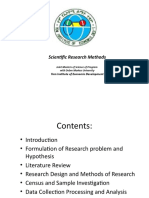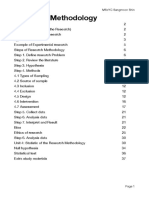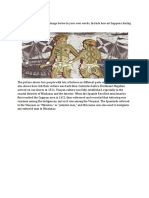Chapter 1 - Nature of Research
Chapter 1 - Nature of Research
Uploaded by
Jullien LagadiaCopyright:
Available Formats
Chapter 1 - Nature of Research
Chapter 1 - Nature of Research
Uploaded by
Jullien LagadiaOriginal Title
Copyright
Available Formats
Share this document
Did you find this document useful?
Is this content inappropriate?
Copyright:
Available Formats
Chapter 1 - Nature of Research
Chapter 1 - Nature of Research
Uploaded by
Jullien LagadiaCopyright:
Available Formats
MODULE: PRACTICAL RESEARCH 2
Chapter 1:
Nature of Research
Objectives:
a) Familiarize with research definition, principles and philosophy.
b) Explains the ethics and integrity of research.
c) Differentiates quantitative from qualitative research.
CHAPTER 1: NATURE OF RESEARCH 1
MODULE: PRACTICAL RESEARCH 2
Introduction to Research and the Research
Process
What is Research?
Research is a systematic process of solving a
problem or finding answers to an inquiry. It is an organized
method of finding or relatively new ideas from the existing
body of knowledge with the help of useful tool for the purpose of improving the quality of
life.
Research is a systematic and organized process of collecting, organizing,
analyzing and interpreting data to find answers to people’s queries.
Research can be defined as the search for knowledge, or as any systematic
investigation, with an open mind, to establish novel facts, solve new or existing problems,
prove new ideas, or develop new theories.
The Basic Principles of Research Design
According to one of the most respected management research textbooks, written
by Easterby-Smith, Thorpe and Jackson, there are four main features of research design,
which are distinct, but closely related.
They are:
Ontology. How you, the researcher, view the world and the assumptions that you
make about the nature of the world and of reality.
Epistemology. The assumptions that you make about the best way of
investigating the world and about reality.
Methodology. The way that you group together your research techniques to make
a coherent picture.
Methods and techniques. What you actually do in order to collect your data and
carry out your investigations.
CHAPTER 1: NATURE OF RESEARCH 2
MODULE: PRACTICAL RESEARCH 2
The Underlying Philosophy
There are four main schools of ontology (how we construct reality), summarized in
this table.
It will hopefully be clear that the underlying philosophy affects the choice of
research methods. For example, a realist will attempt to ‘uncover the truth’, whereas a
relativist will be interested in exploring different people’s ideas of the truth. The two will
require quite different approaches. However, none of these positions are absolutes. They
are on a continuum, with overlaps between them.
Within social sciences, there are also different epistemological approaches, or the
way in which you choose to investigate the world. Your chosen ontology and
epistemology will have implications for your methodology.
1. Positivists - believes that the best way to investigate the world is through objective
methods, such as observations. Positivism fits within a realist ontology.
2. Social Constructionists - believes that reality does not exist by itself. Instead, it
is constructed and given meaning by people. Their focus is therefore on feelings,
beliefs and thoughts, and how people communicate these. Social constructionism
fits better with a relativist ontology.
3. Realists - tend to use a positivist epistemology. They start with hypotheses. They
gather facts through experiments, with a view to proving or disproving their
CHAPTER 1: NATURE OF RESEARCH 3
MODULE: PRACTICAL RESEARCH 2
hypotheses, and therefore confirming, or not, their theory. Clinical trials for new
drugs or treatments are a good example of realist/positivist research.
4. Relativists - tend to take a social constructionist view. They start with questions.
They use case studies and surveys to gather both words (views) and numbers,
which they use to triangulate and compare. From these, they generate theories.
5. Social constructionist - approaches tend to draw on qualitative sources of data,
and positivist approaches on quantitative data.
Quantitative data is about quantities, and therefore numbers.
Qualitative data is about the nature of the thing investigated, and tends to
be words rather than numbers.
Types of Data Sources in Research Methodology
Primary Data - gathered by the researcher themselves, whether through surveys,
interviews, or by counting atoms in a laboratory. Because it is collected for the
purposes of the study, it is intrinsically interesting, although the researcher will also
need to make some comment on it when publishing it.
Secondary Data - is published by someone else, usually a public body or
company, although it may also consist of archive material such as historical
records. A researcher using such data needs to generate new and original insights
into it.
Researchers can either choose to use primary or secondary data for their studies.
Both have their advantages and disadvantages, and most researchers will use a
combination of the two.
The Role of the Researcher
The researcher can be either involved, or external, detached.
These two positions, again, tend to link to the ontology and epistemology, with the
positivist approach leading to a detached view, and the social constructionists tending
towards the researcher being part of the world and therefore influencing, and being
influenced by, events.
What is Research Process?
The process of gathering information for the purpose of initiating, modifying or
terminating a particular investment or group of investments.
A Research process consists of series of actions or steps necessary to effectively
carry out research and the desired sequencing of these steps.
CHAPTER 1: NATURE OF RESEARCH 4
MODULE: PRACTICAL RESEARCH 2
Steps of Research Process
1. Define research problem
2. Review of literature
3. Formulate hypotheses
4. Preparing the research design
5. Data collection
6. Data analysis
7. Interpretation and report writing
Step 1: Define Research Problem
There are two types of research problem
• Relate to state of nature.
• Relationship between variables.
Essentially two steps are involved in define research problem:
• Understanding the problem thoroughly.
• Rephrasing the same into meaningful terms from a point of view.
Step 2: Review of Literature
Once the problem is define, a brief summary of it should be written down. It is
compulsory for a research worker writing a thesis for a Ph.D. degree to write a synopsis
of topic and submit it to necessary committee or the research board for approval.
Step 3: Formulate Hypothesis
Formulate hypothesis is tentative assumption made in order to draw out and test
its logical or empirical consequences. Hypothesis should be very specific and limited to
the piece of research in hand because it has to be tested. The role of the hypothesis is to
guide the researcher by delimiting the area of research and to keep him on the right track.
Step 4: Preparing the Research Design
The function of research design is to provide for the collection of relevant evidence
with minimal expenditure of effort, time and money.
Research purpose may be grouped into four categories, (1) Exploration, (2)
Description, (3) Diagnosis, and (4) Experimentation.
Step 5: Data Collection
Primary data can be collected through:
• By Observation
• Through personal interview
• Through telephone interview
CHAPTER 1: NATURE OF RESEARCH 5
MODULE: PRACTICAL RESEARCH 2
• By mailing of questionnaires
• Through Schedules
Step 6: Data Analysis
The analysis of data requires a number of closely related operations such as
establishment of categories.
This stage mainly include:
1. Coding
2. Editing
3. Tabulation
Step 7: Interpretation and Report Writing
Researcher has to prepare the report of what has been done by him.
Writing of report includes:
1. The preliminary pages
2. The main text
3. The end matter
Research Ethics and Integrity
Ethics
Ethics are standards of moral conduct:
• Standards of right and wrong behavior
• A gauge of personal integrity
• The basis of trust and cooperation in relationships with others
Research Ethics
Rules for distinguishing between right and wrong.
• Avoids Confucius during research.
• Most people learn ethical norms at home, at school, in church, or in other social
settings.
• Moral development occurs throughout life.
• Promote the aims of research, such as knowledge, truth, and avoidance of
error.
Research ethics provides guidelines for the responsible conduct of research. In
addition, it educates and monitors scientists conducting research to ensure a high ethical
standard. The following is a general summary of some ethical principles:
CHAPTER 1: NATURE OF RESEARCH 6
MODULE: PRACTICAL RESEARCH 2
General Summary of Research Ethical Principles
Honesty Honestly report data, results, methods and procedures, and
publication status. Do not fabricate, falsify, or misrepresent data.
Objectivity Strive to avoid bias in experimental design, data analysis, data
interpretation, peer review, personnel decisions, grant writing,
expert testimony, and other aspects of research.
Integrity Keep your promises and agreements; act with sincerity; strive for
consistency of thought and action.
Carefulness Avoid careless errors and negligence; carefully and critically
examine your own work and the work of your peers. Keep good
records of research activities.
Openness Share data, results, ideas, tools, resources. Be open to criticism
and new ideas.
Respect for Honor patents, copyrights, trade secret and other forms of
Intellectual intellectual property. Do not use unpublished data, methods, or
Property results without permission. Give credit where credit is due. Never
plagiarize.
Important Terms:
CHAPTER 1: NATURE OF RESEARCH 7
MODULE: PRACTICAL RESEARCH 2
1. INTELLECTUAL PROPERTY: Intangible creations
protected by law.
2. TRADE SECRET: Intellectual work or products belonging
to a business, not in public domain.
3. COPYRIGHT: Statutory grant protecting intellectual
property from copying by others for 28 years.
4. PATENT: Legal document granting owner exclusive
monopoly on an invention for 17 years.
Confidentiality Protect confidential communications, such as papers or grants
submitted for publication, personnel records, trade or military
secrets, and patient records.
Responsible Publish in order to advance research and scholarship, not to
Publication advance just your own career. Avoid wasteful and duplicative
publication.
Responsible Help to educate, mentor, and advise students. Promote their
Mentoring welfare and allow them to make their own decisions.
Respect for Respect your colleagues and treat them fairly.
Colleague
Social Strive to promote social good and prevent or mitigate social
Responsibility harms through research, public education, and advocacy.
Non- Avoid discrimination against colleagues or students on the basis
Discrimination of sex, race, ethnicity, or other factors that are not related to their
scientific competence and integrity.
Competence Maintain and improve your own professional competence and
expertise through lifelong education and learning; take steps to
promote competence in science as a whole.
Legality Know and obey relevant laws and institutional and governmental
policies.
Animal Care Show proper respect and care for animals when using them in
research. Do not conduct unnecessary or poorly designed animal
experiments.
Human Subjects When conducting research on human subjects, minimize harms
Protection and risks and maximize benefits; respect human dignity, privacy,
and autonomy.
Ethical Principles
Ethical principles are tools which are used to think in difficult situations.
1. Useful ethical principles:
• Minimizing harm
• Respecting autonomy
• Protecting privacy
CHAPTER 1: NATURE OF RESEARCH 8
MODULE: PRACTICAL RESEARCH 2
• Treating people equitably
• Offering reciprocity
2. Promote the aims of research.
3. Prohibitions against falsifying, or misrepresenting research data promote the truth
and avoid error.
4. Ethical standards promote the values that are essential to collaborative work, such
as trust, accountability, mutual respect, and fairness.
Research Integrity
May be defined as “active adherence to the ethical principles and professional
standards essential for the responsible practice of research”.
NAS report definition: "For individuals research integrity is an aspect of moral
character and experience”.
Types of Research Methods
Quantitative and Qualitative Research Methods
Research methods are split broadly into
quantitative and qualitative methods.
Quantitative Research
Quantitative research is perhaps the
simpler to define and identify. The data
produced are always numerical, and they
are analyzed using mathematical and
statistical methods. If there are no numbers
involved, then it’s not quantitative research.
Quantitative research is “explaining
phenomena by collecting numerical data that are analyzed using mathematically based
methods (in particular statistics).”
Sources of Quantitative Data
The most common sources of quantitative data include:
Surveys, whether conducted online, by phone or in person. These rely on the
same questions being asked in the same way to a large number of people;
Observations, which may either involve counting the number of times that a
particular phenomenon occurs, such as how often a particular word is used in
interviews, or coding observational data to translate it into numbers; and
Secondary data, such as company accounts.
CHAPTER 1: NATURE OF RESEARCH 9
MODULE: PRACTICAL RESEARCH 2
Analyzing Quantitative Data
There are a wide range of statistical techniques available to analyses quantitative
data, from simple graphs to show the data through tests of correlations between two or
more items, to statistical significance. Other techniques include cluster analysis, useful
for identifying relationships between groups of subjects where there is no obvious
hypothesis, and hypothesis testing, to identify whether there are genuine differences
between groups.
Qualitative Research
Qualitative research is any which
does not involve numbers or numerical
data. It often involves words or language,
but may also use pictures or photographs
and observations.
Qualitative research seeks to
answer questions about why and how
people behave in the way that they do. It
provides in-depth information about human
behavior.
Qualitative analysis results in rich data that gives an in-depth picture and it is
particularly useful for exploring how and why things have happened.
Sources of Qualitative Data
Although qualitative data is much more general than quantitative, there are still a
number of common techniques for gathering it. These include:
Interviews, which may be structured, semi-structured or unstructured;
Focus groups, which involve multiple participants discussing an issue;
‘Postcards’, or small-scale written questionnaires that ask, for example, three or
four focused questions of participants but allow them space to write in their own
words;
Secondary data, including diaries, written accounts of past events, and company
reports; and
Observations, which may be on site, or under ‘laboratory conditions’, for example,
where participants are asked to role-play a situation to show what they might do.
Analyzing Qualitative Data
Because qualitative data are drawn from a wide variety of sources, they can be
radically different in scope.
There are, therefore, a wide variety of methods for analyzing them, many of which
involve structuring and coding the data into groups and themes. There are also a variety
of computer packages to support qualitative data analysis. The best way to work out which
CHAPTER 1: NATURE OF RESEARCH 10
MODULE: PRACTICAL RESEARCH 2
ones are right for your research is to discuss it with academic colleagues and your
supervisor.
EXPAND YOUR KNOWLEDGE
For further reading please refer to the link provided:
Definition of Research
https://www.youtube.com/watch?v=k1YkD91Ikfc
Research Ethics
https://www.youtube.com/watch?v=jD-YCDE_5yw
Research Writing Process
https://www.youtube.com/watch?v=kAoxB8y1WoY
• https://courses.lumenlearning.com/healthcarecommunication/chapter/text
-the-research-process/
• https://www.etu.org.za/toolbox/docs/development/research.html
• https://www.skillsyouneed.com/learn/research-methods-intro.html
• https://theintactone.com/2019/03/03/brm-u1-topic-6-steps-in-research-
process/
• https://revisesociology.com/2017/11/26/the-steps-of-quantitative-
research/
• https://libguides.library.cityu.edu.hk/researchmethods/ethics
CHAPTER 1: NATURE OF RESEARCH 11
You might also like
- IR 400 Service ManualDocument660 pagesIR 400 Service ManualShangar Doss100% (1)
- Reference: Harmening, D. M. (2012) - Modern Blood Banking & Transfusion Practices (6th Ed.) - Pp. 434Document5 pagesReference: Harmening, D. M. (2012) - Modern Blood Banking & Transfusion Practices (6th Ed.) - Pp. 434Kolin N Jandoc100% (1)
- Practice Test 04: D. Preferring To WatchDocument8 pagesPractice Test 04: D. Preferring To WatchMinh An TrầnNo ratings yet
- Chapter 1 Methods of ResearchDocument12 pagesChapter 1 Methods of ResearchKimberly Dazo100% (1)
- Chapter 1 - Introducing ResearchDocument13 pagesChapter 1 - Introducing ResearchArly TolentinoNo ratings yet
- A Careful Investigation or Inquiry Especially Through Search For New Facts in Any Branch of Knowledge.Document15 pagesA Careful Investigation or Inquiry Especially Through Search For New Facts in Any Branch of Knowledge.Netsanet MeleseNo ratings yet
- Chapter 1 - Introducing ResearchDocument14 pagesChapter 1 - Introducing ResearchRamir ConcepcionNo ratings yet
- Practical Research 1 (M1) Grade 10Document11 pagesPractical Research 1 (M1) Grade 10Christela Torreta100% (1)
- Research MethodologyDocument48 pagesResearch Methodologyashwath44100% (9)
- Scientific Research Methods: Yom Institute of Economic DevelopmentDocument88 pagesScientific Research Methods: Yom Institute of Economic DevelopmentEyasu DestaNo ratings yet
- PR1 - QTR 3 - Week 1Document7 pagesPR1 - QTR 3 - Week 1mark.oliNo ratings yet
- Research MethodolgyDocument4 pagesResearch MethodolgyRizwan BalouchNo ratings yet
- Research NotesDocument45 pagesResearch NotesEvans MogakaNo ratings yet
- Las 2 Research I Q3Document10 pagesLas 2 Research I Q3Emmanuel Mark Del RosarioNo ratings yet
- Nature and Functions of Research The Meaning of Research. Research Can Be Well-Defined From SeveralDocument21 pagesNature and Functions of Research The Meaning of Research. Research Can Be Well-Defined From SeveralPrime RietaNo ratings yet
- PR 1 ReviewerDocument7 pagesPR 1 ReviewerJAMES GAMERNo ratings yet
- OK Lecture 1Document48 pagesOK Lecture 1Xinyi MaNo ratings yet
- Introduction To Research: July 2016Document25 pagesIntroduction To Research: July 2016Subash DangalNo ratings yet
- Introductionto ResearchDocument25 pagesIntroductionto ResearchAnne MaviNo ratings yet
- Introduction, Nature and Functions of ResearchDocument8 pagesIntroduction, Nature and Functions of ResearchPrime RietaNo ratings yet
- Research II Lesson 1Document35 pagesResearch II Lesson 1Zarah Leeann P. ZafraNo ratings yet
- Basic Research MethodDocument208 pagesBasic Research MethodTesfu HettoNo ratings yet
- STA630 Important NotesDocument11 pagesSTA630 Important Notesdopofe8559No ratings yet
- Research AssignmentDocument53 pagesResearch Assignmentsukhbir_k8375% (4)
- Ang Pretty Ko (PR1 NOTES)Document6 pagesAng Pretty Ko (PR1 NOTES)My Brightest Star Park JisungNo ratings yet
- R.M. NotesDocument37 pagesR.M. NotesAlex BerensonNo ratings yet
- Research Methods1Document231 pagesResearch Methods1Habtamu GaromaNo ratings yet
- RM Notes by Sangmoon ShinDocument37 pagesRM Notes by Sangmoon Shinbeyond travellingNo ratings yet
- MBA Research MtdsDocument241 pagesMBA Research MtdsBarzala CarcarNo ratings yet
- IntroductiontoResearch PDFDocument25 pagesIntroductiontoResearch PDFjohnNo ratings yet
- Research NewDocument55 pagesResearch Newbienvenufabrice2001No ratings yet
- Bped 5 Module OneDocument31 pagesBped 5 Module OneKyla Marrie Diovan TaculodNo ratings yet
- Res 1 Mod 1Document31 pagesRes 1 Mod 1mikaela perezNo ratings yet
- RM 2Document15 pagesRM 2Rahul KumarNo ratings yet
- Chapter 1 (RM)Document17 pagesChapter 1 (RM)lidiyafikru3417No ratings yet
- RM SummaryDocument44 pagesRM SummaryRABEYA BASORINo ratings yet
- Research Methodology UnitDocument70 pagesResearch Methodology Unityazhini.uNo ratings yet
- Introductionto ResearchDocument25 pagesIntroductionto ResearchMichael IgnacioNo ratings yet
- RES01 Ch01 Intro ConceptsDocument4 pagesRES01 Ch01 Intro ConceptsMarnelNo ratings yet
- Course 1 An Introduction To Research Methodology - 0d479f91efcd118ff9978c39d75fff6Document4 pagesCourse 1 An Introduction To Research Methodology - 0d479f91efcd118ff9978c39d75fff6lilitulelielNo ratings yet
- Fundamentals of Social Research 1Document44 pagesFundamentals of Social Research 1Md monir MollickNo ratings yet
- RES Earch 2: First QuarterDocument7 pagesRES Earch 2: First QuarterAlexah QuezonNo ratings yet
- Research Methodology 20th AprilDocument66 pagesResearch Methodology 20th Aprilbanupriya.p2002No ratings yet
- 20RMI17 - PG - Notes - Tejaswini B JDocument50 pages20RMI17 - PG - Notes - Tejaswini B JMallikarjunaswamy SwamyNo ratings yet
- BMSIT NotesDocument50 pagesBMSIT NotesNISHANTH DEVANGNo ratings yet
- Research Process BBM 502: Aditi Gandhi BBM VTH Sem. 107502Document13 pagesResearch Process BBM 502: Aditi Gandhi BBM VTH Sem. 107502geetukumari100% (1)
- Chapter 1Document30 pagesChapter 1Jubert PadillaNo ratings yet
- Basic Research Method 1 & 2Document75 pagesBasic Research Method 1 & 2Kat SullvianNo ratings yet
- Elijah Institute of Management Studies Business Research Methods For ManagementDocument52 pagesElijah Institute of Management Studies Business Research Methods For ManagementDr Linda Mary SimonNo ratings yet
- Research MethodologyDocument73 pagesResearch MethodologyDawaNo ratings yet
- L1 - W1 - TPS211 - Introduction To Survey ResearchDocument24 pagesL1 - W1 - TPS211 - Introduction To Survey ResearchADREANA FARHANIM MOHD YUSOFNo ratings yet
- Course ContentsDocument13 pagesCourse ContentsAtik MahmudNo ratings yet
- Module 1 - Concept PresentationDocument4 pagesModule 1 - Concept PresentationCherylyn BenoliraoNo ratings yet
- Practical ResearchDocument20 pagesPractical ResearchYza Velle100% (2)
- BRM NotesDocument39 pagesBRM Notespooja mittalNo ratings yet
- Practical Research 1 Revised ModuleDocument36 pagesPractical Research 1 Revised ModuleEve Dave100% (1)
- Research Workbook Group 2Document9 pagesResearch Workbook Group 2Rexsha ConoNo ratings yet
- Business Research: Nature and Feature of ResearchDocument43 pagesBusiness Research: Nature and Feature of ResearchAshish NeupaneNo ratings yet
- Choosing a Research Method, Scientific Inquiry:: Complete Process with Qualitative & Quantitative Design ExamplesFrom EverandChoosing a Research Method, Scientific Inquiry:: Complete Process with Qualitative & Quantitative Design ExamplesNo ratings yet
- Investigating the Psychological World: Scientific Method in the Behavioral SciencesFrom EverandInvestigating the Psychological World: Scientific Method in the Behavioral SciencesNo ratings yet
- A Practical Guide to Qualitative Research: A Guide for Research Students, Supervisors, and Academic AuthorsFrom EverandA Practical Guide to Qualitative Research: A Guide for Research Students, Supervisors, and Academic AuthorsNo ratings yet
- ACTIVITY2Document1 pageACTIVITY2Jullien LagadiaNo ratings yet
- Hres13 - Chapter 3 - The Importance of Quantitative Research Across FieldsDocument8 pagesHres13 - Chapter 3 - The Importance of Quantitative Research Across FieldsJullien Lagadia0% (1)
- Activity 4Document1 pageActivity 4Jullien LagadiaNo ratings yet
- Hres13 - Chapter 2 - Characteristics, Strengths, Weaknesses and KindsDocument9 pagesHres13 - Chapter 2 - Characteristics, Strengths, Weaknesses and KindsJullien LagadiaNo ratings yet
- COVID-19: Impact of Distance Learning Education Toward Grade 11 STEM Student's Academic PerformanceDocument3 pagesCOVID-19: Impact of Distance Learning Education Toward Grade 11 STEM Student's Academic PerformanceJullien LagadiaNo ratings yet
- Concept Paper: Femininity: Impacts To Society in Pinugay, Baras RizalDocument2 pagesConcept Paper: Femininity: Impacts To Society in Pinugay, Baras RizalJullien LagadiaNo ratings yet
- The NecklaceDocument1 pageThe NecklaceJullien LagadiaNo ratings yet
- Cleartrip Flight Domestic E-TicketDocument3 pagesCleartrip Flight Domestic E-TicketMkm ZafarNo ratings yet
- Capital BudgetingDocument30 pagesCapital BudgetingAbdullah ZakariyyaNo ratings yet
- Disney Marketing Analytics OptimizationDocument26 pagesDisney Marketing Analytics OptimizationPhilip ThomasNo ratings yet
- The University of TrentoDocument14 pagesThe University of TrentoBunga Nafeera HassanNo ratings yet
- Windows NT Win32 API Super BibleDocument2,050 pagesWindows NT Win32 API Super BibleVeliV100% (1)
- 1 4 Extrema and Average Rates of ChangeDocument35 pages1 4 Extrema and Average Rates of ChangeDenise WUNo ratings yet
- Wiring and Main Controller Layout: 4-1. IGBT Control 119Document136 pagesWiring and Main Controller Layout: 4-1. IGBT Control 119Евгений100% (1)
- English 7 Q3 Las L1Document5 pagesEnglish 7 Q3 Las L1Akio LukbanNo ratings yet
- 0102 Physics Paper With Answer EveningDocument5 pages0102 Physics Paper With Answer EveningDeepakNo ratings yet
- Final Draft Fpren 15316-4-4: European Standard Norme Européenne Europäische NormDocument27 pagesFinal Draft Fpren 15316-4-4: European Standard Norme Européenne Europäische NormraduvlasaNo ratings yet
- PCA - Italy v. India - Enrica Lexie Incident - Final Award 2020 PDFDocument6 pagesPCA - Italy v. India - Enrica Lexie Incident - Final Award 2020 PDFHMEHMEHMEHMENo ratings yet
- STP of DominosDocument8 pagesSTP of DominosAbhijit PandaNo ratings yet
- Hold Harmless Agreement TemplateDocument4 pagesHold Harmless Agreement Templatedrix100% (1)
- RadiSys EPC 6A ManualDocument74 pagesRadiSys EPC 6A ManualRashid AzamNo ratings yet
- Accountancy: Goodwill: Nature and Valuation 1:00 HOURS Maximum Marks: 20Document3 pagesAccountancy: Goodwill: Nature and Valuation 1:00 HOURS Maximum Marks: 20PRABHAT JOSHINo ratings yet
- Kaplan TurbineDocument6 pagesKaplan Turbinegopal sapkotaNo ratings yet
- Rewrite 1Document12 pagesRewrite 1. Hu?nh Th? ??nhNo ratings yet
- Social Capital TheoryDocument3 pagesSocial Capital TheoryWasafAliAzmatNo ratings yet
- Citómetro de Flujo Becton Dickinson FACSCaliburDocument4 pagesCitómetro de Flujo Becton Dickinson FACSCaliburCarlos FernandezNo ratings yet
- Yemen: Humanitarian Response PlanDocument143 pagesYemen: Humanitarian Response PlanBaleegh Al-sharabyNo ratings yet
- 01 2 Coca - Cola V CA GR 110295Document2 pages01 2 Coca - Cola V CA GR 110295Chamscb CNo ratings yet
- cs8392 Object Oriented Programming Oops Question BankDocument13 pagescs8392 Object Oriented Programming Oops Question Banksecondyear2325No ratings yet
- Exam FM Practice Exam With Answer KeyDocument71 pagesExam FM Practice Exam With Answer KeyAki TsukiyomiNo ratings yet
- DehDocument34 pagesDehAnand Swami100% (2)
- Iso 2859-1Document2 pagesIso 2859-1Daniel MargineanNo ratings yet
- ABA-Constant-Torque Standard-DatasheetDocument1 pageABA-Constant-Torque Standard-DatasheetgauravNo ratings yet
- Rigor vs. PeopleDocument6 pagesRigor vs. PeopleRocky MagcamitNo ratings yet
































































































